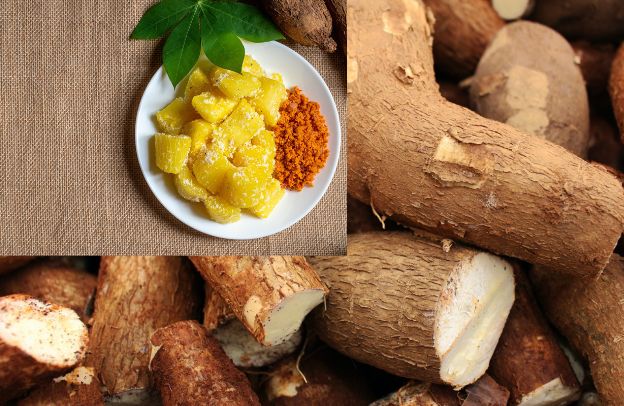The Cultural and Economic Significance of Cassava in Nigeria

Have you ever considered that a simple root vegetable could be the key to transforming Africa’s agricultural landscape? Cassava, a staple in Nigerian cuisine, offers not only cultural richness but also significant economic opportunities. As a member of the African diaspora, you have a unique position to leverage this potential, creating jobs and addressing food insecurity.
Learn How to Leverage Your Story through our Story to Asset Framework.
Cassava is deeply embedded in Nigerian culture, serving as a primary food source for millions. Nigeria stands as the world’s largest producer of cassava, contributing approximately 24% to its Gross Domestic Product (GDP) and employing over 36% of the labor force. (Aclasses.org)
Beyond its role as a staple food, cassava presents vast economic potential. The global demand for gluten-free and alternative flours has opened new markets for cassava products. By investing in cassava processing and value addition, you can tap into these emerging opportunities, benefiting both local farmers and international consumers.
Preparing Cassava: From Harvest to Table
Understanding the journey of cassava from the field to the plate is crucial. Harvesting typically occurs between nine to eighteen months after planting. Once harvested, cassava must be peeled, cleaned, and processed promptly to prevent spoilage. Traditional methods like soaking, fermenting, and drying are employed to remove naturally occurring cyanogenic compounds, ensuring the safety and palatability of the final product.
See also: Traditional Cassava Dishes in Nigeria
Immersing yourself in Nigerian cuisine reveals a variety of cassava-based dishes:
- Garri: A versatile staple made by fermenting and roasting cassava, enjoyed as a snack or reconstituted into a dough-like consistency called “eba,” often paired with soups.
- Fufu: A smooth, stretchy dough created by boiling and pounding cassava, commonly served alongside various traditional soups.
- Cassava Porridge:
A comforting breakfast option where cassava is boiled, mashed, and mixed with ingredients like coconut milk and sugar.
These dishes not only highlight the versatility of cassava but also its central role in Nigerian culinary traditions.
Modern Innovations: Cassava in Contemporary Cuisine
The culinary world is witnessing innovative uses of cassava:
- Cassava Flour: A gluten-free alternative gaining popularity in baking, catering to health-conscious consumers and those with dietary restrictions.
- Cassava Fries: A crispy, healthier substitute for traditional potato fries, appealing to a broad audience.
- Cassava Pizza Crust: Offering a gluten-free base for pizzas, this innovation aligns with current health trends and dietary preferences.
These modern adaptations not only expand the culinary applications of Cassava but also open new market avenues for entrepreneurs.
Challenges and Solutions for Small and Medium-Scale Farmers
Despite its potential, cassava farming faces several challenges, particularly for small and medium-scale farmers. These include limited access to modern farming technologies, inadequate infrastructure, and challenges related to soil fertility and pest management. Additionally, farmers often struggle with inadequate access to financing, which makes it difficult for them to invest in better production methods or to expand their operations.
Climate change also poses a threat, as unpredictable weather patterns can severely affect cassava yields. However, solutions such as improved access to agricultural extension services, better credit facilities, the adoption of climate-resilient cassava varieties, and the implementation of sustainable farming practices can help mitigate these issues and improve productivity.
Despite its potential, cassava farming faces several challenges:
- Processing Infrastructure: Limited access to modern processing facilities hampers the production of high-quality cassava products. Solution: Investing in modern milling and processing plants is critical. Diaspora investors can collaborate with local agricultural bodies to access grants and incentives.
- Quality Control Standards: To compete globally, Nigerian cassava products must meet strict regulatory standards. Solution: Partnering with organizations like the Standards Organization of Nigeria (SON) can ensure compliance with industry standards.
- Limited Awareness Among Farmers: Many smallholder farmers are unaware of the economic potential of cassava beyond traditional uses. Solution: Government and private sector initiatives should educate farmers on the benefits of high-quality cassava production and its diverse applications.
Cassava: A Cultural and Economic Asset
Cassava is more than just a staple food in Nigeria; it is deeply woven into the country’s cultural identity, economic framework, and food security strategy. From its historical significance in traditional Nigerian cuisine to its role in shaping modern agribusiness opportunities, cassava represents both heritage and economic transformation.
For African diaspora entrepreneurs, investing in cassava agribusiness is not just a financial decision, it is a chance to drive sustainable development, create employment, and contribute to food security solutions in Nigeria and beyond.
Preserving Nigerian Culture Through Cassava
Cassava-based foods like garri, fufu, and tapioca have been passed down for generations, forming an essential part of Nigeria’s culinary traditions. The process of cultivating, processing, and consuming cassava is deeply embedded in local customs and communal lifestyles.
In many Nigerian households, cassava dishes are central to daily meals and social gatherings. Supporting cassava production means preserving these traditions, ensuring that future generations continue to enjoy and pass down these culturally significant foods.
Beyond food, cassava has also found its way into local festivals, storytelling, and indigenous knowledge systems. Investing in cassava agribusiness not only strengthens its cultural relevance but also encourages local communities to take pride in their agricultural heritage while improving economic opportunities.
Cassava as an Economic Engine
Nigeria is the world’s largest producer of cassava, contributing approximately 24% of global cassava production (FAO2024). Despite this massive production, the country lags in value addition, processing efficiency, and export penetration. Raw cassava is often sold at lower prices, limiting farmers’ income and reducing its potential for economic growth.
However, by investing in cassava processing industries, entrepreneurs can bridge this gap and unlock new revenue streams. Cassava’s versatility presents multiple business opportunities, including:
- Cassava Flour Production: The global demand for gluten-free products is rising. Cassava flour, a gluten-free alternative to wheat, presents a lucrative export opportunity.
- Starch and Sweetener Production: Cassava starch is widely used in food processing, pharmaceuticals, and industrial applications. Nigeria imports most of its starch requirements, yet local production could replace these imports and boost domestic industry.
- Ethanol and Biofuel Production: Cassava-based ethanol is a sustainable alternative to fossil fuels. With Nigeria and other African countries focusing on renewable energy, cassava could be a key raw material for bioethanol production.
- Animal Feed and Biodegradable Packaging: Cassava byproducts can be processed into livestock feed or environmentally friendly packaging solutions, offering eco-conscious business prospects.
By investing in these value-added industries, African diaspora entrepreneurs can stimulate Nigeria’s agribusiness sector, improve farmer incomes, and create employment along the cassava value chain.
Addressing Food Security Through Cassava Agribusiness
Nigeria faces significant food security challenges, with an estimated 25 million people at risk of hunger in 2024 (World Food Program, 2024). As a drought-resistant crop with high caloric content, cassava is crucial in mitigating food shortages.
Unlike grains like maize and rice, which are highly susceptible to climate fluctuations, cassava can thrive in poor soils and withstand harsh conditions, making it a resilient food source for millions. Investment in Cassava Agribusiness can help address food security by:
- Enhancing Domestic Food Supply: Processed cassava products such as flour, chips, and fortified foods can increase access to affordable, nutritious food.
- Reducing Dependence on Food Imports: Nigeria spends billions annually on wheat, rice, and corn imports. Strengthening cassava production can substitute these imports and retain capital within the local economy.
- Encouraging Smallholder Farmer Participation: Over 70% of Nigeria’s farmers are smallholders, often struggling with low productivity. By providing financing, improved seed varieties, and access to modern processing facilities, diaspora investors can empower small farmers, enhance productivity, and improve livelihoods.
The Role of the African Diaspora in Cassava Agribusiness
For members of the African diaspora seeking to make a lasting impact, cassava agribusiness presents a promising path. With strategic investments, mentorship programs, and partnerships with Nigerian agricultural institutions, you can help modernize cassava farming, improve processing efficiency, and drive export competitiveness.
Opportunities to get involved include:
- Investing in Cassava Processing Facilities: Setting up small- to medium-scale processing plants to produce flour, starch, or ethanol.
- Supporting Farmer Cooperatives:
Providing funding, training, and technology to help smallholder farmers scale their production.
- Exporting Cassava Products:
Establishing supply chains to bring Nigerian cassava products to global markets, especially in regions with high demand for gluten-free and organic foods.
- Advocating for Policy Support: Engaging with policymakers to improve cassava value chain infrastructure, access to financing, and export regulations.
- Rice Production in Africa: The Role of Government Policies and Investment
See also: The Economic Benefits Of Cassava Cultivation In Nigeria
Conclusion: Cassava as a Vehicle for Sustainable Development
Cassava is more than just a staple food; it is a catalyst for economic transformation and food security in Nigeria. By investing in cassava agribusiness, you are not only preserving Nigerian culture but also creating jobs, strengthening rural economies, and enhancing food sustainability.
For African diaspora entrepreneurs looking to give back to their roots while making profitable investments, cassava offers a powerful opportunity.
With the right vision, strategic partnerships, and commitment, you can contribute to Nigeria’s agricultural prosperity and help reshape Africa’s agribusiness landscape for generations to come. The question remains: Are you ready to be part of the Cassava revolution?
Learn How to Leverage Your Story through our Story to Asset Framework.




